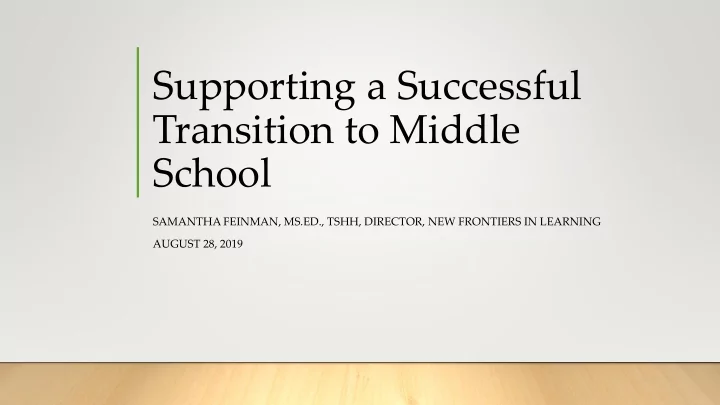

Supporting a Successful Transition to Middle School SAMANTHA FEINMAN, MS.ED., TSHH, DIRECTOR, NEW FRONTIERS IN LEARNING AUGUST 28, 2019
Independence Through Developmental Expectations Elementary School Middle School High School College/Post Secondary Same teacher majority of Multiple teachers – team Limited coordination Independence with day approach among teachers professors Lack of ‘shifting’ Moving between classes, Tests on same days - Multiple responsibilities expectations, relations juggling from each class – up to student to balance work Limited homework Homework for each class Final exams, limited Papers, exams, outside strategies provided for course work – different overall approach in each class Parent involvement is Decrease in parent Continued decrease in Parent involvement expected and encouraged involvement parent involvement discouraged, prohibited without waiver Parent Signatures Some signatures Only with major issues Not allowed Problems identified by Teacher identifies need Extra help offered, Office Hours - teacher and for extra help - sometimes encouraged, independent individualized encouraged, sometimes up to student to follow approaches offered ‘required’ through
Issues with Levels of Support During Transitions: Skill and Systems Micromanagement Development and Sink or Swim Support
Overview – What are Executive Function Skills? • Higher order metacognitive processes that assist one in being able to monitor and control his/her thoughts and actions and facilitate goal-directed behavior (Burgess, 1997) • “ The CEO of the brain ” • How one gets themselves from “Point A” to “Point B” • How one regulates their behavior
Skills to Achieve a Goal vs. Skills to Guide Behavior
Development of EF Skills • Executive functioning skills appear in the first few years of life • Before the age of two, children demonstrate executive functioning skills, such as working memory, inhibitory control, and task shifting (Nielsen, et al., 2017) • Executive functioning skills continue to develop and mature through adolescence and young adulthood (Best, Miller, & Jones, 2009) • Executive functioning skills as a predictor… • Best predictor of school readiness and success (Blair & Razza, 2007) • The Silver Lining… • As executive functioning skills develop, students have an increased chance of succeeding in educational environments that are more demanding (Meltzer, 2010)
Developmental Tasks Requiring EF Skills in Middle School • Middle School • Uses a system for organizing schoolwork • Follow complex school schedule • Plan and carry out long-term projects
Why are EF Skills so Important? Effective Strategy Use Focused Efficient Effort Performance Academic Success Cycle: Meltzer, Reddy, Sales Pollica, Positive and Roditi (2004b) Academic Academic Success Self-Concept
What is a parent’s role? • Younger individuals need to be taught these things • Avoid just doing things for your children, have them a part of the process • Includes things like: • Scheduling (shower schedules, when to do homework, etc.) • Finding solutions to homework problems – not just providing solutions • Communicating teachers • Coping with stress • Getting started on and persisting through the completion of homework • Involvement of parents is key to help spread values of education
How a Parent Can Help • Executive Functions • Perseverance and Grit • Do not DO it for them, but help encourage • Focus on coping with struggle, not them to do it themselves removing struggle • Inner monologue – out loud – explain • Connect the results after persevering and process then connect how good it feels • Problem Solving • Parents can teach help seeking behavior by admitting their own weaknesses and limitations – it is OKAY to ask for help
Examples Of Planning for the Transition: • Become familiar with the new space and routines • Prepare for multiple teachers with different rules and procedures – learn to be flexible! • Practice self-advocacy skills • Identify new systems for communicating with teachers • Adjust sleeping patterns if need be
Contact Information: Samantha Feinman, Director Questions? New Frontiers in Learning 80 Broad Street, Suite 1702 New York, NY 10004 142 Mineola Ave., Suite 3B Roslyn Heights, NY 11577 (646) 558-0085 sfeinman@nfil.net www.nfil.net
Recommend
More recommend